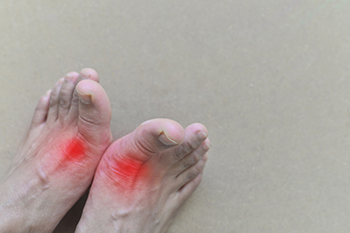
Dr. Kenneth Rosenthal
Dr. Jonathan C. O’Quinn
Dr. Michael J. Price

Dr. Kenneth Rosenthal
Dr. Jonathan C. O’Quinn
Dr. Michael J. Price

Gout, a form of inflammatory arthritis, manifests through a distinctive set of symptoms that characterize its presence. One of the most common signs is sudden, intense joint pain, often affecting the big toe. This pain is typically accompanied by swelling and redness around the affected joint, creating a visibly inflamed and tender area. The onset of gout attacks can be abrupt, with discomfort escalating rapidly. Limited mobility in the affected joint is a prevalent consequence, making it challenging for individuals to bear weight or move the joint freely. Gout attacks can also induce a discomfort that persists even between episodes. Recognizing these signs is essential for a timely diagnosis and intervention. Seeking medical advice and exploring lifestyle modifications can mitigate the impact of gout, allowing individuals to manage symptoms and lead a more comfortable, mobile life. Gout can cause extreme pain and discomfort. If you have had one or frequent gout attacks, it is strongly suggested that you are under the care of a podiatrist who can help you to successfully manage this condition.
Gout is a painful condition that can be treated. If you are seeking treatment, contact one of our podiatrists from Eastern Carolina Foot & Ankle Specialists. Our doctors will treat your foot and ankle needs.
What Is Gout?
Gout is a form of arthritis that is characterized by sudden, severe attacks of pain, redness, and tenderness in the joints. The condition usually affects the joint at the base of the big toe. A gout attack can occur at any random time, such as the middle of the night while you are asleep.
Symptoms
Risk Factors
Prior to visiting your podiatrist to receive treatment for gout, there are a few things you should do beforehand. If you have gout you should write down your symptoms--including when they started and how often you experience them, important medical information you may have, and any questions you may have. Writing down these three things will help your podiatrist in assessing your specific situation so that he or she may provide the best route of treatment for you.
If you have any questions, please feel free to contact our office located in Greenville, NC . We offer the newest diagnostic and treatment technologies for all your foot care needs.